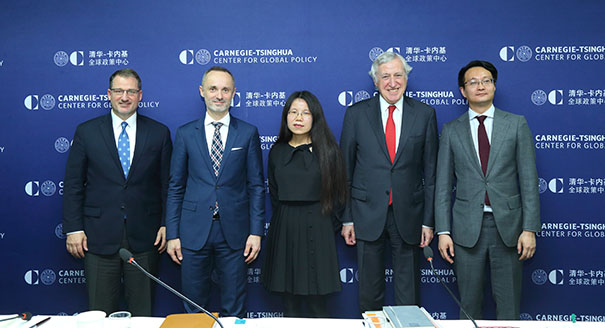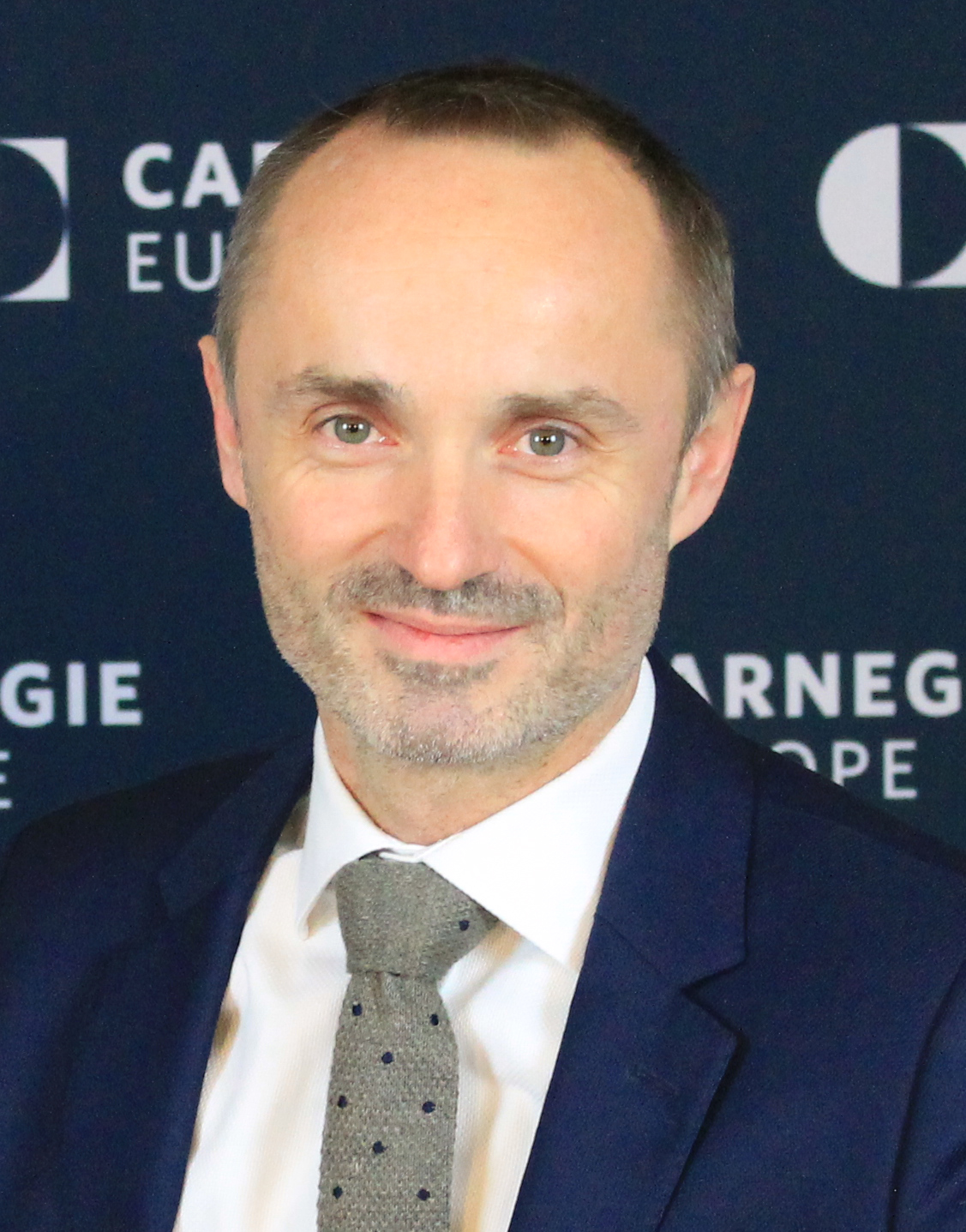{
"authors": [
"Paul Haenle",
"Tomáš Valášek",
"Zhao Chen",
"Pierre Vimont",
"Li Jingkun"
],
"type": "event",
"centerAffiliationAll": "",
"centers": [
"Carnegie Endowment for International Peace",
"Carnegie China"
],
"collections": [
"U.S.-China Relations"
],
"englishNewsletterAll": "",
"eventCollection": [
"Global Dialogue Series"
],
"nonEnglishNewsletterAll": "",
"primaryCenter": "Carnegie Endowment for International Peace",
"programAffiliation": "",
"programs": [],
"projects": [],
"regions": [
"North America",
"United States",
"East Asia",
"China",
"Western Europe"
],
"topics": [
"Economy"
]
}
China-EU Relations: The Road Ahead
Tue, March 26th, 2019
Beijing
Brexit and the continued momentum of populist movements across the continent have rendered the future of the European Union (EU) uncertain. As anti-establishment leaders gain more influence, many observers worry about the direction of European politics. China’s rise continues to play a larger role in the shifting dynamics within Europe as the EU’s largest economies debate further economic engagement with Beijing. Several countries across Europe, most recently Italy, have signed onto the Belt and Road Initiative, while France, Germany, and other Western European powers remain skeptical about China’s ambitious infrastructure development project. Meanwhile, questions surrounding the strength of transatlantic relations and tensions from the U.S.-China trade war have complicated EU relations with both Washington and Beijing. How will changes in European politics alter China-EU ties, inter-European relations, and the broader international order?
On the last day of President Xi Jinping’s visit to Europe, Carnegie–Tsinghua Center Director Paul Haenle moderated a discussion between Carnegie scholars and scholars from the Institute of European Studies at the Chinese Academy of Social Sciences.
This panel was the third of the Carnegie Global Dialogue Series 2018-2019 and cosponsored by the Chinese Academy of Social Sciences’ Institute of European Studies.
This event was off the record.
Discussion Highlights
- The U.S. Impact on EU-China Relations: The discussants agreed that the shift in Europe’s tone toward China overlaps with President Xi’s more assertive foreign policy but was not necessarily driven by it. The main reason behind Brussels’ increasingly heated rhetoric is cooling U.S.-Europe relations and the realization that the rules-based order is under threat. In addition, Europe, as well as the United States, is concerned about securing better trade terms with and protecting intellectual property rights in China.
- Europe’s Multidimensional Challenges: While facing pressure in the international arena, Europe is also dealing with pressing internal issues. Brexit and the rise of populism are wake-up calls for the EU and need to be properly addressed. Moreover, the upcoming EU elections and the adoption of a new financial framework will allow Europe to redefine and reset its priorities. The experts agreed that Europe feels as though it is falling behind in crucial areas such as 5G, which is leading it to embrace stronger industrial policies.
- Europe’s Balanced Approach Toward China: Given Beijing’s growing global footprint, Europe no longer views China as a developing economy and wants to build a more balanced, reciprocal relationship. China’s economic policies also concern European experts, and Brussels referred to China as an “economic competitor” and “systemic rival” in a recent report, contrasting with the EU’s earlier perception of China as a global stabilizing force. The new approach means Beijing will no longer be eligible for preferential economic treatment, but these changes will not derail broader cooperation.
- Engagement over Rivalry: While EU-China competition appears to be growing, the discussants argued that cooperative engagement will remain the focus for Brussels and Beijing. China and Europe share interests like combating climate change, strengthening the multilateral international order, and collaborating on issues related to Africa, Iran, and the Korean Peninsula. Some panelists noted that economic frictions can be alleviated through the further opening of the Chinese economy.
Paul Haenle
Paul Haenle holds the Maurice R. Greenberg Director’s Chair at the Carnegie–Tsinghua Center for Global Policy based at Tsinghua University in Beijing. His research focuses on Chinese foreign policy and U.S.-China relations.
Tomáš Valášek
Tomáš Valášek is the director of Carnegie Europe, where his research focuses on security and defense, transatlantic relations, and Europe’s Eastern neighborhood.
Zhao Chen
Zhao Chen is a senior research fellow and professor, as well as the chief of the European Diplomacy Department at the Institute of European Studies at the Chinese Academy of Social Sciences (CASS).
Pierre Vimont
Pierre Vimont is a senior fellow at Carnegie Europe. His research focuses on the European Neighborhood Policy, transatlantic relations, and French foreign policy. He served as the French ambassador to the United States from 2007 to 2010.
Li Jingkun
Li Jingkun is head of the Division of European Politics at the Institute of European Studies at the Chinese Academy of Social Sciences. Her research focuses on the politics of the European Union and British studies.
Carnegie does not take institutional positions on public policy issues; the views represented herein are those of the author(s) and do not necessarily reflect the views of Carnegie, its staff, or its trustees.
Event Speakers
Paul Haenle held the Maurice R. Greenberg Director’s Chair at the Carnegie Endowment for International Peace and is a visiting senior research fellow at the East Asian Institute, National University of Singapore. He served as the White House China director on the National Security Council staffs of former presidents George W. Bush and Barack Obama.
Valášek was director of Carnegie Europe and a senior fellow, where his research focused on security and defense, transatlantic relations, and Europe’s Eastern neighborhood.
Zhao Chen
Vimont is a senior fellow at Carnegie Europe. His research focuses on the European Neighborhood Policy, transatlantic relations, and French foreign policy.
Li Jingkun


